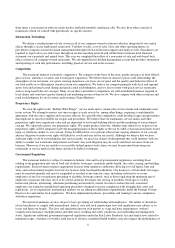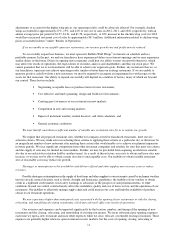Buffalo Wild Wings 2012 Annual Report Download - page 17
Download and view the complete annual report
Please find page 17 of the 2012 Buffalo Wild Wings annual report below. You can navigate through the pages in the report by either clicking on the pages listed below, or by using the keyword search tool below to find specific information within the annual report.17
There is volatility in our stock price.
The market for our stock has, from time to time, experienced extreme price and volume fluctuations. Factors such as
announcements of variations in our quarterly financial results and fluctuations in same-store sales could cause the market price
of our stock to fluctuate significantly. In addition, the stock market in general, and the market prices for restaurant companies
in particular, have experienced volatility that often has been unrelated to the operating performance of such companies. These
broad market and industry fluctuations may adversely affect the price of our stock, regardless of our operating performance.
Additionally, volatility or a lack of positive performance in our stock price may adversely affect our ability to retain key
employees, many of whom have been granted equity compensation.
The market price of our stock can be influenced by stockholders' expectations about the ability of our business to grow
and to achieve certain profitability targets. If our financial performance in a particular quarter does not meet the expectations of
our stockholders, it may adversely affect their views concerning our growth potential and future financial performance. In
addition, if the securities analysts who regularly follow our stock lower their ratings of our stock, the market price of our stock
is likely to drop significantly.
We may be subject to increased labor and insurance costs.
Our restaurant operations are subject to federal and state laws governing such matters as minimum wages, working
conditions, overtime, and tip credits. As federal and state minimum wage rates increase, we may need to increase not only the
wages of our minimum wage employees, but also the wages paid to employees at wage rates that are above minimum wage.
Labor shortages, increased employee turnover, and health care mandates could also increase our labor costs. This, in turn,
could lead us to increase prices which could impact our sales. Conversely, if competitive pressures or other factors prevent us
from offsetting increased labor costs by increases in prices, our profitability may decline. In addition, the current premiums
that we pay for our insurance (including workers' compensation, general liability, property, health, and directors'
and officers' liability) may increase at any time, thereby further increasing our costs. The dollar amount of claims that we
actually experience under our workers' compensation and general liability insurance, for which we carry high per-claim
deductibles, may also increase at any time, thereby further increasing our costs. Also, the decreased availability of property
and liability insurance has the potential to negatively impact the cost of premiums and the magnitude of uninsured losses.
Our current insurance may not provide adequate levels of coverage against claims.
We currently maintain insurance customary for businesses of our size and type. However, there are types of losses we
may incur that cannot be insured against or that we believe are not economically reasonable to insure, such as losses due to
natural disasters. Such damages could have a material adverse effect on our business and results of operations.
We are dependent on information technology and any material failure of that technology could impair our ability to
efficiently operate our business.
We rely on information systems across our operations, including, for example, point-of-sale processing in our
restaurants, management of our supply chain, collection of cash, payment of obligations, and various other processes and
procedures. Our ability to efficiently manage our business depends significantly on the reliability and capacity of these
systems. The failure of these systems to operate effectively, problems with maintenance, upgrading or transitioning to
replacement systems, or a breach in security of these systems could cause delays in customer service, reduce efficiency in our
operations, require significant investment to remediate the issue, or cause negative publicity that could damage our brand.
Significant capital investments might be required to remediate any problems.
If we are unable to maintain our rights to use key technologies of third parties, our business may be harmed.
We rely on certain technology licensed from third parties, and may be required to license additional technology in the future
for use in managing our Internet sites and providing related services to users and customers. These third-party technology
licenses may not continue to be available to us on acceptable commercial terms or at all. The inability to enter into and maintain
any of these technology licenses could significantly harm our business, financial condition and operating results.
We may not be able to protect our trademarks, service marks or trade secrets.
We place considerable value on our trademarks, service marks and trade secrets. We actively enforce and defend our
marks and if violations are identified, take appropriate action to preserve and protect our goodwill in our marks. We attempt
to protect our sauce recipes as trade secrets by, among other things, requiring confidentiality agreements with our sauce
























